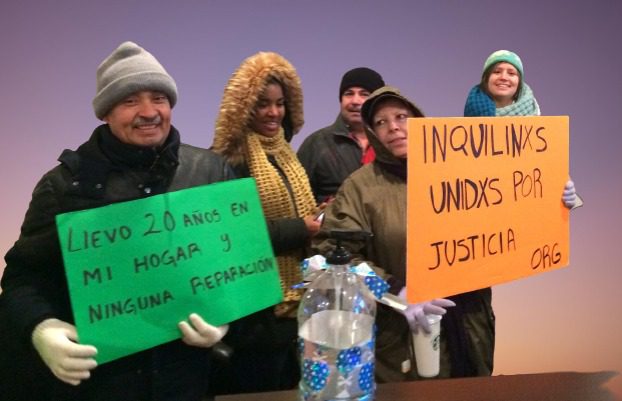United Renters for Justice: In a remarkable David versus Goliath story, a group of tenants in North Minneapolis has successfully taken on one of America’s largest corporate landlords, Progress Residential. United Renters for Justice, the advocacy group formed by these tenants, has shown that organized protests and community action can bring about tangible results, even when facing a powerful corporate giant. Their fight for better living conditions, rent freezes, and refunds serves as an inspiration to tenants across the country.
The Struggle Against Progress Residential
Progress Residential, backed by private-equity firm Pretium Partners, is the largest provider of single-family homes for rent in the United States. With a portfolio of almost 90,000 properties, they have been acquiring homes across the country, targeting fast-growing metropolitan areas. However, in North Minneapolis, a predominantly Black neighborhood, many Progress tenants have found themselves living in poorly maintained homes plagued by issues like black mold, pest infestations, broken windows, cracked foundations, and insufficient heat during harsh winters. Despite these conditions, Progress has been increasing rents, further exacerbating the tenants’ challenges.
The Birth of United Renters for Justice
United Renters for Justice emerged as a collective response to the dire living conditions faced by Progress tenants. Tenants like Jimari Brown, whose home was infested with vermin and had crumbling basement walls, felt compelled to take action. Shanika Henderson, another long-term tenant, joined the group after enduring insufficient heat and unaddressed repairs. United Renters for Justice brought these tenants together, giving them a platform to voice their concerns and demand change.
Protests and Advocacy Efforts
United Renters for Justice embarked on a multifaceted approach to advocate for their rights. They engaged in door-to-door outreach, informing fellow tenants about the group’s activities and enlisting their support. The tenants organized protests in front of Progress Residential’s local offices, drawing attention to their demands for improved living conditions. They encouraged residents to report complaints through the city’s helpline and educated tenants on alternative rent payment methods if repairs were not made. Despite their persistent efforts, Progress Residential has thus far declined to meet with the tenants, highlighting the need for continued advocacy.
Legal Battles and Accountability
Minnesota’s attorney general, Keith Ellison, filed a lawsuit against Progress Residential and its affiliate, HavenBrook Homes, alleging violations of tenant rights and failure to make necessary repairs. The legal battle is ongoing, with Pretium Partners denying the allegations and fighting to be excluded as a defendant. Ellison emphasizes that both owners and operators must be held accountable for the conditions faced by tenants. The pending ruling on Pretium Partners’ involvement will have significant implications for future accountability in the industry.
Tenant Victories and Progress’s Response
Despite the challenges, United Renters for Justice has achieved notable victories. Through their collective efforts, they have secured rent-to-own options for tenants and relocation support during property repairs. These successes can be attributed to the relentless determination of the tenants and the community support they garnered. However, while Progress Residential has made some repairs in response to the tenants’ demands, there is still a long way to go in addressing all the issues faced by the tenants.
Also Read: Breaking Barriers to South Korea
Implications and Community Impact
Progress Residential’s expansion and acquisition of properties have not only led to subpar living conditions but have also hindered homeownership opportunities for first-time and lower-income buyers. The Private Equity Stakeholder Project’s report highlights the wealth creation that could have benefited local residents, instead going to the wealthy firm. This raises concerns about affordability and the impact of corporate landlords on communities.
City Officials Take Action
City officials, including Minneapolis and Columbia Heights, have taken notice of the tenants’ plight and implemented measures to hold landlords accountable. Emergency repairs must be completed promptly, and retaliation against tenants demanding repairs is prohibited. Furthermore, utilities must be billed in the renter’s name, ensuring easier access to energy assistance programs.
Conclusion of United Renters for Justice
The fight against Progress Residential undertaken by United Renters for Justice demonstrates the power of collective action in challenging powerful corporate entities. These tenants have proven that when communities unite and organize, they can achieve tangible results, even against seemingly insurmountable odds. By advocating for improved living conditions, rent freezes, and refunds, United Renters for Justice has become a beacon of hope for tenants everywhere. Their fight for dignified housing continues, inspiring others to stand up and demand their rights in the face of corporate landlords.
Our Reader’s Queries
Is the eviction moratorium still in effect in Minnesota?
As of June 1, 2022, all rules protecting tenants from being kicked out of their homes due to the COVID-19 pandemic will no longer be in effect.
What is the tenant rights organization in Minneapolis?
HOME Line offers complimentary and budget-friendly legal, coordination, educational, and support services for tenants across Minnesota, allowing them to independently address their rental housing concerns. They supply various no-cost template letters to assist in articulating and recording rental housing issues.

